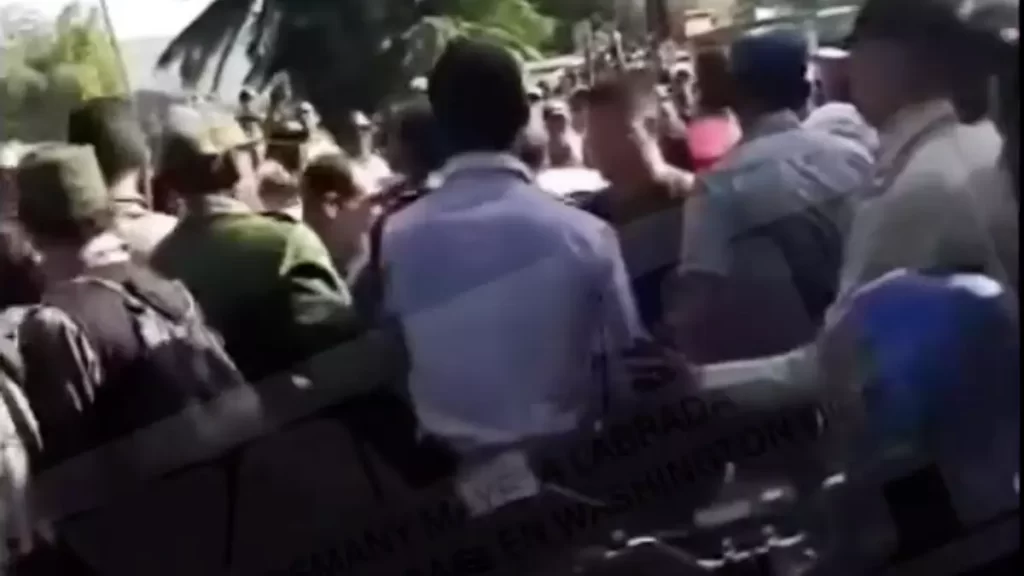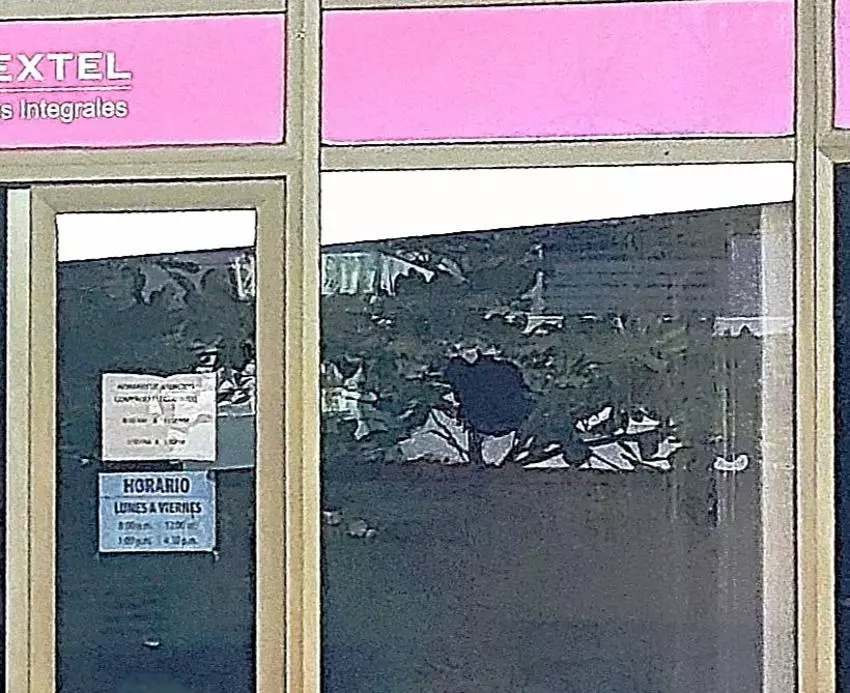
![]() 14ymedio, Havana, 18 March 2024 — For the second day in a row, dozens of people gathered in front of a police station in El Cobre, a town in Santiago de Cuba province. The Cuban government and the Foreign Ministry, however, are pushing another narrative. They attribute the protest to interference from Washington and have summoned the U.S. chargé d’affaires in Havana, Benjamin Ziff, to complain.
14ymedio, Havana, 18 March 2024 — For the second day in a row, dozens of people gathered in front of a police station in El Cobre, a town in Santiago de Cuba province. The Cuban government and the Foreign Ministry, however, are pushing another narrative. They attribute the protest to interference from Washington and have summoned the U.S. chargé d’affaires in Havana, Benjamin Ziff, to complain.
Several videos posted on social media claim the demonstration started after family memebers of the three detainees staged a protest in front of the police station on Sunday to call for their release.
In one of the videos posted by independent journalist Yosmany Mayete Labrada, police officers and soldiers can be seen trying to arrest a young man as several civilians intervene to stop them. Several demonstrators also sat in the middle of the street, blocking a squad car which was there to take the young man to jail.
Clips from other videos show protesters shouting “freedom” as the police officers advance towards the crowd with clubs in their hands. “The town is heavily militarized and people have tried to prevent the police from transferring three protesters who were unjustly arrested,” Mayeta stated on Facebook.
#17M #RepresiónCuba Frente a la estación de Policía del poblado de El Cobre, en Santiago de Cuba, decenas de personas se aglomeraron este lunes, en una segunda jornada de protestas en la misma localidad | Video: Yosmany Mayeta/Facebook https://t.co/Ji3fXzcTrM pic.twitter.com/smaIVQo84Q
— 14ymedio (@14ymedio) March 18, 2024
Following protests on Saturday, the Cuban government accused Washington of trying to destablilize the country. On Monday the Foreign Ministry took things one step further, summoning Ziff to a meeting with Deputy Foreign Minister Carlos Fernández de Cossío to lodge a formal complaint.
In a press release, the Foreign Ministry stated, “The American diplomat was reminded of the minimum standards of decency and honesty that are expected of a diplomatic mission in any country, which the United States embassy in Cuba is incapable of observing. It was also pointed out that this diplomatic office and its personnel are obliged to behave in accordance with the rules of the Vienna Convention on Diplomatic Relations.”
Once again, they reminded Ziff that the U.S. bears direct responsibility for Cuba’s economic crisis, particularly for “the depression and shortage of essential goods and services,” which it blamed on the U.S. trade embargo, calling it ’the blockade’. They also accused Washington of pursuing a policy of destabilization with clearly “aggressive purposes” and brought up the issue of Cuba’s presence on the State Department’s list of state sponsors of terrorism. In a revealing final comment, they also blamed the United States for targeting the country’s fuel imports and for “intimidating businesspeople, visitors, artists and any person with an interest and right in interacting with the Cuban people.”
“I think what we are seeing is a reflection of the dire situation on the island”
The social-media profile pages of Foreign Minister Bruno Rodríguez and President Miguel Díaz-Canel have devoted space to the official version of the events, claiming they were carried out by a tiny group of concerned citizens but manipulated by the “enemies of the Revolution.” They also warned the US embassy in Havana that it must “refrain from interfering in the internal affairs of the country and inciting social disorder.”
The Biden administration has not remained silent. Brian Nichols, Assistant Secretary of State for Western Hemisphere Affairs, stated on social media, “The United States supports the right of the Cuban people to assemble peacefully.”
Nichols added that the Cuban government will not be able to satisfy the needs of its people until it adopts democracy and the rule of law, and respects the rights of its citizens.
#17M #RepresiónCuba Frente a la estación de Policía del poblado de El Cobre, en Santiago de Cuba, decenas de personas se aglomeraron este lunes, en una segunda jornada de protestas en la misma localidad | Video: Yosmany Mayeta/Facebook https://t.co/Ji3fXzcTrM pic.twitter.com/smaIVQo84Q
— 14ymedio (@14ymedio) March 18, 2024
“Let me just be quite unambiguous about this. The United States is not behind these protests in Cuba and the accusation of that is absurd,” State Department spokesman Vedant Patel told reporters on Monday. He added, “Protests across several cities in Cuba yesterday called for electricity, food, and fundamental freedoms. I think what we are seeing is a reflection of the dire situation on the island. We urge the Cuban Government to refrain from violence and unjust detentions and are calling on the authorities to respect the Cuban citizens’ right to peaceful assembly.”
This weekend’s protests began Saturday night in Cacocum, a town in Holguín province. Residents there came out to demand an end to the blackouts, banging pots and pans, and shouting “We want power.” The gesture was replicated on Sunday in the city of Santiago de Cuba, where the local government tried to control the situation by restoring electricity and cutting off the internet. In the nearby village of El Cobre, protesters began shouting “No to violence” in the presence of police patrols and soldiers.

Following the example of Santiago de Cuba’s provincial communist party leader, local leaders climbed on the roof of a building in an effort to calm the demonstrators, who responded by shouting “No one elected you.”
Locals in Sancti Spíritus report that a Copextel store and a branch of the People’s Savings Bank were pelted with stones in downtown Julio Antonio Mella Street on Sunday. Evidence of the attack was visible on Monday in the form of a hole in a window of the state-run store and a missing door at the bank, which was removed for repairs.
The protests in Santiago were followed by others in Santa Marta, a small town near Varadero in the midst of a blackout, and Bayamo. A video of the demonstrations in Granma shows a group of citizens struggling with police officers while others flee to avoid being beaten. In a video posted by La Hora de Cuba, hundreds of people can be seen chanting “Homeland and Life” and singing the national anthem. The site claims that the entire city is under military lockdown. A third video posted on social media confirms the presence of security patrols blocking a street, identified in the responses as Zenea Street, to prevent the protesters from continuing their march.
Only in El Cobre did residents return to the streets on Monday. Many cities throughout the country, such as Havana, were under military lockdown and remained eerily quiet.
____________
COLLABORATE WITH OUR WORK: The 14ymedio team is committed to practicing serious journalism that reflects Cuba’s reality in all its depth. Thank you for joining us on this long journey. We invite you to continue supporting us by becoming a member of 14ymedio now. Together we can continue transforming journalism in Cuba.
